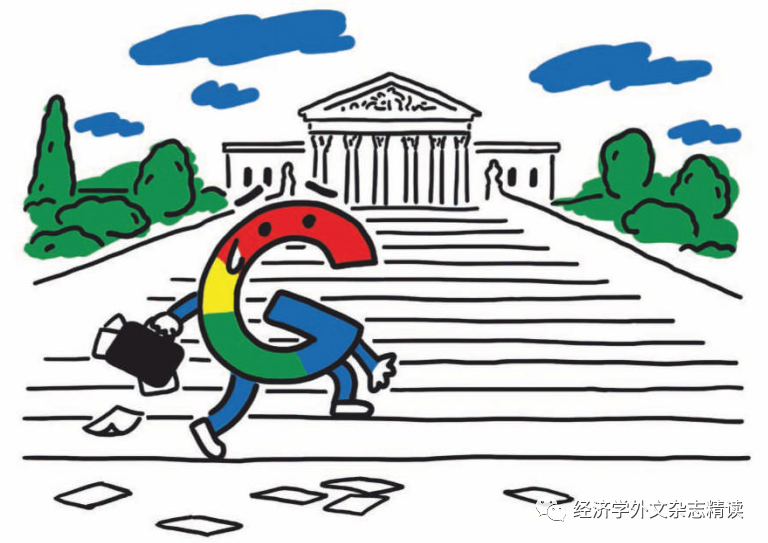Google is once again facing an antitrust investigation
Google Makes Its Case
That's what Google is all about
This article is from Bloomberg BusinessWeek 2020-10-05
The company will cite broad market definitions and privacy to fight U.S. monopoly suit
The company will cite broad market definitions and privacy rights to fight U.S. monopoly lawsuits

Google is expected in the coming days to be hit with the biggest U.S. antitrust lawsuit since the government went to battle with Microsoft Corp. two decades ago. Ofcially, the company hasn’t laid out its legal arguments yet. But piecing together submissions to other antitrust authorities, executive blog posts, and congressional testimony gives a picture of Google’s strategy.
Google is expected to be hit by U.S. antitrust lawsuits in the coming days, since the government and Microsoft Corp. 20 years ago. The biggest lawsuit since the war began. In fact, the company has yet to make its legal arguments. But by piecing together submissions to other antitrust agencies, executive blog posts and congressional testimony, Google's strategy is at a glance.
Justice Department investigators have been probing whether the Alphabet Inc.-owned company uses its dominance of online search, web browsers, and advertising technology to unfairly block out rivals, pressure businesses into buying more ads, and benefit the rest of its digital empire, people familiar with the investigation have said.
Investigators at the U.S. Department of Justice have been looking into whether Alphabet Inc. used its dominance of online search, web browsers and advertising technology to unfairly crowd out competitors, forcing companies to buy more ads and benefiting the rest of its digital empire, people familiar with the matter said.
Google has already sought to discredit the foundation of these arguments. “We don’t agree that we’re dominant. We don’t agree that there isn’t a ton of choice,” Don Harrison, head of corporate development, said during a Sept. 15 congressional hearing. Although Google controls about 90% of the search engine market, consumers get information online in other ways as well: They look for news on Twitter, gift ideas on Pinterest, and products on Amazon.com, the company has argued. This is a common tactic in antitrust cases. Regulators try to defne a market narrowly to illustrate a lack of competition, while corporations create a universe of rivals that’s as wide as possible.
Google has tried to question the basis of these arguments. "We don't think we're dominant. Don Harrison, the company's director of development, said at a congressional hearing on September 15. While Google controls about 90 percent of the search engine market, the company says consumers also get information online in other ways: they look for news on Twitter, they look for gift ideas on Pinterest, they look for products on Amazon. This is a common tactic in antitrust cases. Regulators try to intervene narrowly to show a lack of competition, and companies create a world of competitors, the wider the better.
Google has also leaned on another major theme in tech regulation as a defense: privacy. Sometimes the company has to change its services to limit sharing of consumer data online or improve user privacy in other ways. That can hurt rival businesses. Google executives have privately complained about being stuck in a “damned if you do, damned if you don’t” situation. If the company shares less data, advertising rivals and partners shout antitrust. If it opens up, privacy advocates cry foul.
Google also relies on another important theme of technology regulation to defend itself: privacy. In some cases, the company has had to change its services to limit the sharing of consumer data online or to improve user privacy in other ways. This could hurt a competitor's business. Google executives privately complain that they are stuck in a "do it, do it don't do it" situation. If the company shares less data, advertising competitors and partners will shout antitrust. If made public, privacy advocates will call it a quit.
In January, Google said its Chrome browser would eliminate trackers used to measure ad performance within two years, because consumers don’t like being followed around the web. Chrome is the most used U.S. browser, so that would represent a seismic shift for the industry; and dozens of rival ad-tech providers have had to rush to fnd alternate ways of operating or risk becoming obsolete. Most of Google’s business is less reliant on these trackers, which means it’s set to gain at the expense of smaller competitors with fewer ways of targeting and measuring data. It’s also used privacy to defend its decision to limit rival ad-tech providers from accessing its YouTube platform, the world’s largest online video service.
In January, Google said its Chrome browser would eliminate trackers used to measure ad performance within two years because consumers did not like to be tracked online. Chrome, america's most popular browser, will be a big change in the industry; dozens of ad technology rivals will have to scramble to find other ways to operate or risk being eliminated. Much of Google's business is not dependent on these trackers, which means it will target and measure data in fewer ways at the expense of smaller competitors. Google has also used privacy protections to limit the decisions of rivals such as advertising technology providers to access its YouTube platform. YouTube is the world's largest online video service.
Google’s ad-tech business handles almost every part of the process of buying and selling display ads online. Competitors, advertisers, and publishers have complained that its tools don’t always plug in easily with products from other companies, pushing the entire ecosystem toward Google.
Google's advertising technology business covers almost every aspect of the online advertising process. Competitors, advertisers and publishers complain that Google's tools don't always easily connect with other companies' products, pushing the entire ecosystem to Google.
In a May 2019 report to the Australian Competition and Consumer Commission, a lawyer for the company used 67 footnote-filled pages to argue that its ad-tech business supports competition rather than quashes it. Individual competitors or customers may feel certain actions are unfair, but that’s because Google has to balance it all, the report said. Benevolent keeper of the internet is a role Google repeatedly assumes in its defense. Search, YouTube, Maps, and Gmail are all free for ordinary users and directly beneft small businesses, Chief Executive Officer Sundar Pichai told a congressional hearing in July.
In a report to the Australian Competition and Consumer Commission in May 2019, a lawyer for the company spent 67 pages arguing that its advertising technology business supported rather than curbed competition. Individual competitors or customers may find certain behavior unfair, but that's because Google has to balance it all, the report said. In its antitrust defense, Google often describes itself as the benevolent guardian of the Internet. Sundar Pichai, Google's chief executive, told a congressional hearing in July that search, YouTube, maps and Gmail were free for the average user and directly benefited small businesses.
The pandemic’s forcing more businesses online has become part of this argument, too. “Nearly one-third of small-business owners say that without digital tools they would have had to close all or part of their business during Covid,” Pichai said. He characterized his ad-tech empire almost as if it were a charity set up for the good of the broader internet. “It’s a low-margin business for us,” the CEO said. “We do it because we want to help support publishers.
The outbreak has forced more companies to internet and become part of the debate. "Nearly a third of small business owners say that without digital tools, they will have to close all or part of their businesses during the outbreak," Mr. Pichay said. He describes his advertising technology empire as a charity set up for broader Internet interests. "It's a low-margin business for us, " the CEO said. "We're doing this because we want to help support publishers.
"Relevant past wonderful recommendations"
Follow long and press QR code for more news


Go to "Discovery" - "Take a look" browse "Friends are watching"